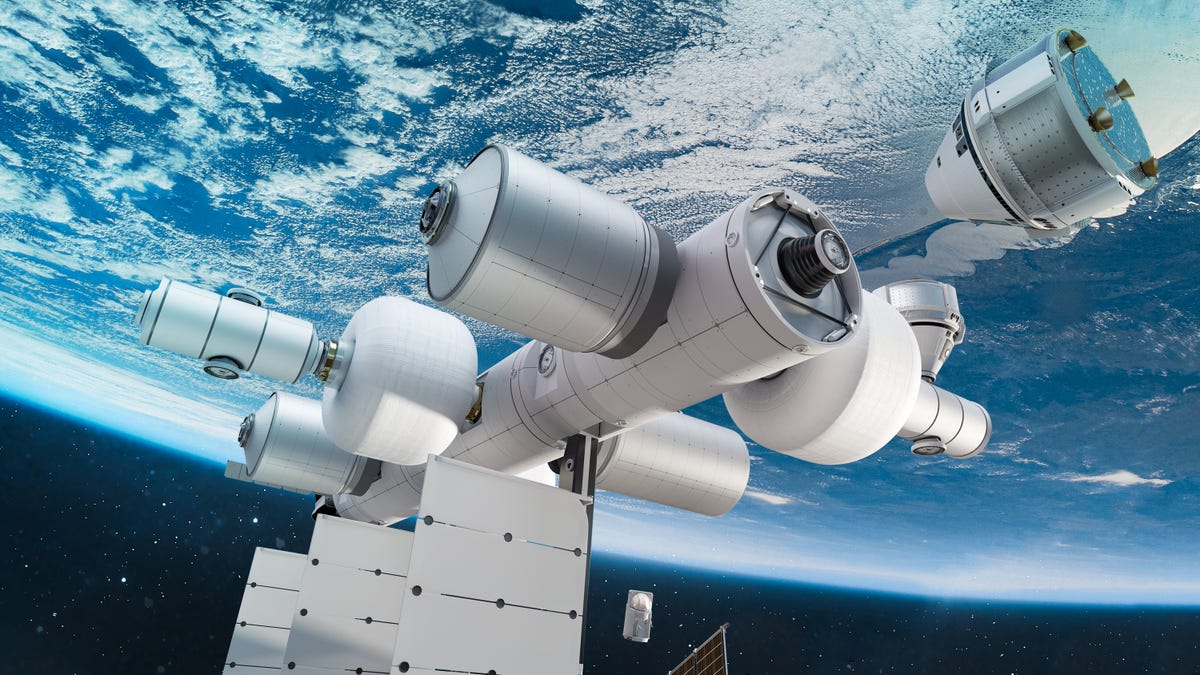
Once among the star companies championing a deal to create a private successor to the International Space Station, talks between Jeff Bezos’ Blue Origin and Sierra Space regarding the Orbital Reef project now appear to be souring.
CNBC reports that the two space companies are potentially discussing an end to their partnership regarding Orbital Reef, citing three anonymous sources. The situation is reportedly “fluid” and talks are ongoing, but its likely that the two will cease the collaboration. According to the outlet, other projects from the respective companies are taking precedent over the Orbital Reef space station. NASA, however, is confirming that Orbital Reef is moving forward and that Blue Origin is still involved.
Advertisement
“Blue Origin continues to develop the Orbital Reef commercial low Earth orbit destination as part of its Space Act Agreement (SAA) with NASA. There are no current plans to transfer or terminate the agreement,” NASA Public Affairs Officer Rebecca Turkington told Gizmodo in an email today. “Per the SAA, any changes to the assignment of the agreement to another entity would need to be approved by NASA. Also, all parties would have to agree and meet the required provisions.”
NASA did not immediately confirm Sierra Space’s continued involvement. Blue Origin reiterated NASA’s disposition telling Gizmodo on the phone that the company was “actively engaged in designing and testing a multitude of deliverables to NASA for our CLD [Low Earth Orbit destinations] Phase 1 contract and [is] excited about how this work will help shape NASA’s CLD Phase 2 destination goals.” Blue Origin did not confirm or deny Sierra Space’s involvement in Orbital Reef. Sierra Space did not immediately return Gizmodo’s request for comment.
Advertisement
Advertisement
According to CNBC, Blue Origin is more interested in focusing on its upcoming lunar lander while Sierra Space is giving more attention to its spaceplane project. The Blue Moon lunar lander is being developed after Blue Origin won a $3.4 billion contract to build and test a human landing system in collaboration with Lockheed Martin, Boeing, Draper, Astrobotic, and Honeybee Robotics. The fully reusable lunar lander will hold a crew of four and is expected to be a part of the Artemis 5 mission, scheduled for launch in 2029.
Meanwhile, Sierra Space’s Dream Chaser spaceplane appears to be finally getting off the ground. Dream Chaser is designed to fly in low Earth orbit after hitching a ride on a rocket, like ULA’s Vulcan Centaur, while handling its own atmospheric re-entry and runway landings. The plane can host three to seven crew members and up to 12,000 pounds (5,443 kilograms) of cargo, transporting it all to pivotal stops in LEO, including the International Space Station. The company revealed earlier this summer that it had conducted its first power-up of Dream Chaser, during which engineers simulated the power inputs that the spaceplane would generate with its solar array. This week, Sierra Space also took home a whopping $290 million in Series B funding to develop develop its own commercial space station.
Blue Origin revealed Orbital Reef in 2021 as a “mixed use business park” in collaboration with Sierra Space. Orbital Reef will help NASA fill the gap in LEO that will be left behind by the International Space Station, which is scheduled to be decommissioned in 2030. The planned space station passed a System Definition Review in August 2022, with NASA approving Blue Origin’s plans for the project, allowing the company to move into the design phase.
Sierra Space has been developing its Large Integrated Flexible Environment (LIFE) habitat for Orbital Reef. LIFE is a three-story platform designed for both low Earth orbit and long-duration missions that can house habitation and science efforts. The LIFE modules would be attached to Orbital Reef to host guests, and Sierra Space intentionally exploded a scale model of one of the habitats in a second strength test last December.
Advertisement
This article was updated to include comment from Blue Origin.
For more spaceflight in your life, follow us on X (formerly Twitter) and bookmark Gizmodo’s dedicated Spaceflight page.
Services Marketplace – Listings, Bookings & Reviews